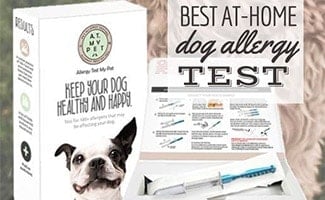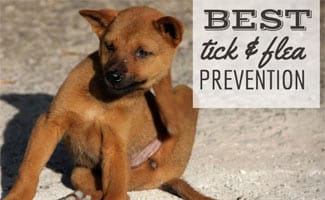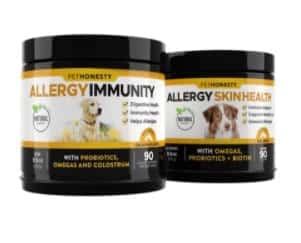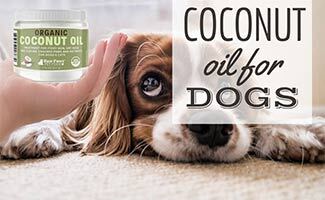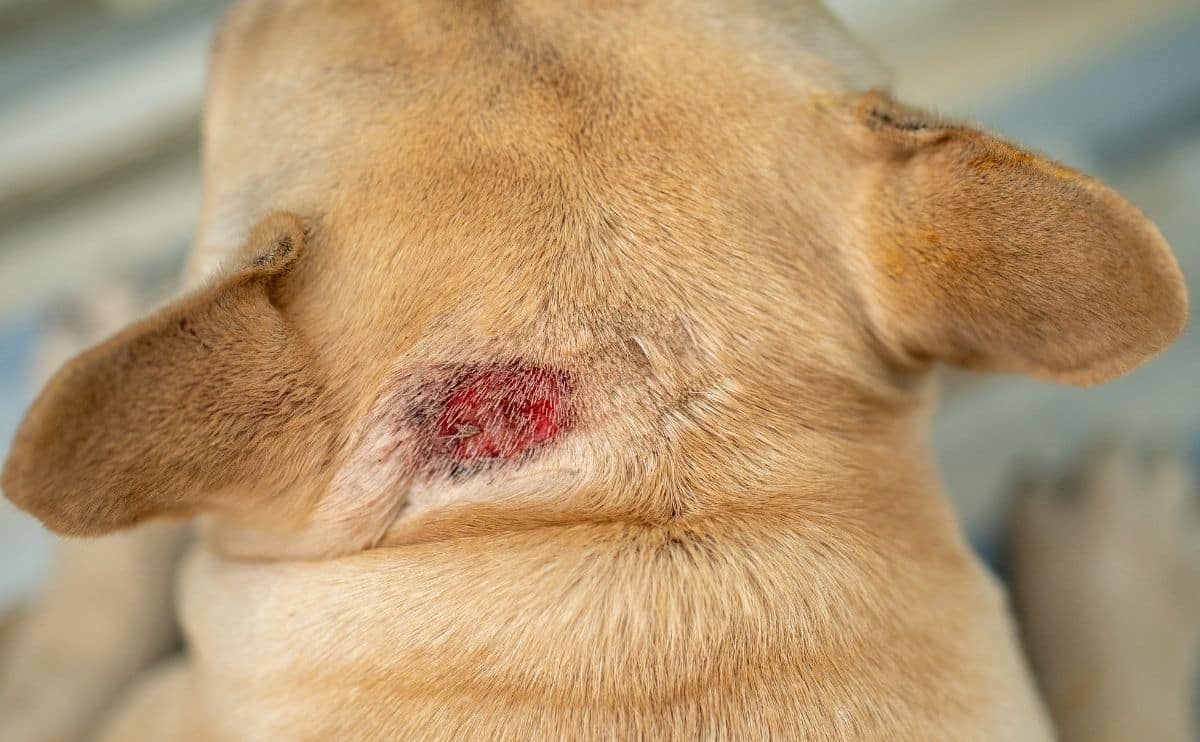Dog Skin Allergies: Causes, Symptoms, Home Remedies, Treatment & More
When you purchase through links on our site, we may earn a commission. Here’s how it works.
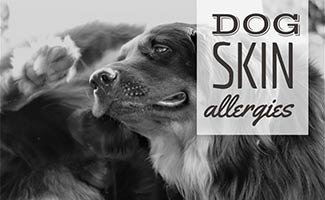
Is your dog scratching and licking herself excessively? Does her skin look red or irritated? You’re certainly not alone. Dog skin allergies are among the most common reasons pet owners seek veterinary care, which can add up fast. Before your dog is diagnosed with skin allergies or other health conditions, you should consider pet insurance as a financial management tool to help cover related expenses.
Table of Contents
But how do you know if your dog has skin allergies or if something else is going on? If it is allergies, what’s the cause? And what should you do if you suspect your pup has skin allergies? We’ll answer these questions and more to help you give your dog some much-needed relief.
What Causes Skin Allergies In Dogs?
A skin allergy, often called allergic dermatitis or atopic dermatitis, is a chronic itchy skin condition that can affect any dog. When dogs have this condition, they experience an allergic reaction to one (or more) of these general causes:
- Inhaling or having direct skin contact with environmental allergens (pollen, dust mites, grass, mold spores, etc.)
- Ingesting a substance (like food ingredients or medication) to which they have an insensitivity
- Flea bites
- Allergic reaction to normal bacterial flora on the skin
What Is Atopic Dermatitis In Dogs?
Canine atopic dermatitis, or canine atopy, is the medical term for hay fever in dogs. It is often used to characterize a common form of dog skin allergy in which dogs are allergic to a wide variety of environmental factors (typically by inhalation). It can be hereditary, more often affecting purebred dogs, but mixed breeds are also susceptible. Breeds with a higher risk include:
- Boxers
- Dalmatians
- French Bulldogs
- German Shepherds
- Golden Retrievers
- Irish Setters
- Labrador Retrievers
- Lhasa Apsos
- Pugs
- Shih Tzus
- Terriers (most types)
In one large study published in the Journal of the American Veterinary Medical Association, researchers analyzed medical records of more than 27,000 dogs from the UC Davis veterinary clinic to compare the incidence of 24 genetic disorders in mixed versus purebred dogs. They found that the risk of atopy was significantly higher in purebreds. The breeds with the highest rates of atopy in this study were West Highland White Terriers, Coonhounds, Wirehaired Fox Terriers, Cairn Terriers, and Tibetan Terriers.
Dog Skin Allergy Symptoms

Skin allergy symptoms differ depending on the type of allergen and the severity of the reaction. But generally, dogs will exhibit some of these common signs:
- Frequent itching (localized or over the entire body)
- Excessive licking
- Biting, chewing, and gnawing at his skin
- Red, inflamed skin
- Dry or oily skin
- Rashes
- Hives and other bumps
- Hair loss
- Itchy ears (shaking his head back and forth)
- Swollen face and paws
How Do I Determine The Cause?
It’s often tricky to figure out what’s causing dog skin allergies, so consulting your veterinarian is the best course of action. Your vet can help determine possible causes through a systematic process of elimination and may even want to conduct allergy tests.
Diagnosing a flea allergy is usually straightforward, but other causes may take some time. Veterinarians can diagnose food allergies through an elimination diet. This involves putting your dog on a food trial, where you feed your dog one source of protein and carbohydrate for anywhere from 6 to 12 weeks. The protein and carbohydrate in the elimination diet will be entirely new to your dog.
An additional avenue is to give your pup an at-home dog allergy test. These kits test for sensitivity or intolerance to food and environmental factors that develop over time. You send in a saliva or hair sample to the company’s lab and get results within a few weeks. You can then share these results with your vet to help further narrow down possible causes.
Treatment
Once your veterinarian determines the cause and severity of your dog’s allergies, she’ll select the best course of treatment. The best way to treat skin allergies is to avoid the offending allergen. Flea allergies are usually the easiest to treat by killing the fleas and using a flea prevention medication.
For food allergies, changing your dog’s diet can often do the trick. The most common food ingredients that cause dog allergies are:
- Grains (corn, oats, wheat, or whey)
- Dairy products
- Meats (beef, chicken, pork, lamb, or fish)
Switching to customizable dog food could be a great solution. Several dog food delivery companies that we review can customize your dog’s food based on allergies. There are also hypoallergenic dog treats available.
With environmental allergies, it may not be possible to avoid the allergen entirely. If your dog suffers from indoor or outdoor allergies, your veterinarian can prescribe an allergy relief medication to help relieve symptoms. Getting an air purifier for your house may help. If your dog has scratched and damaged her skin so much that it has become infected, your vet will prescribe an antibiotic to clear up the infection.
Remedies For Itchy Skin
Many products on the market can help relieve your dog’s itchy skin. Here are some of our top picks. We recommend consulting with your vet before giving your dog any supplements or other home treatment to make sure they’re okay for your pup.
PetHonesty has various excellent dog allergy relief products, including allergy support chews, a skin allergy food topper, itch relief shampoo, and anti-scratch salmon oil. Their products contain natural ingredients with no fillers. PetHonesty’s facility is FDA-approved and Good Manufacturing Practices (GMP)-certified with a Level 3 Safe Quality Food certification.
You may also want to consider King Kanine’s Anti-Itch Spray. This all-natural spray contains CBD oil (THC-free), aloe vera, tea tree oil, chamomile, and colloidal silver to relieve itching and control skin inflammation. King Kanine manufactures it in an FDA and GMP-certified facility and they have independent testing to ensure quality, purity, and safety.
Home Remedies
If you’re looking for an easy home remedy, an oatmeal bath may help soothe your pup’s itchiness. Just sprinkle ground oats into warm bath water and let your dog soak for 10-15 minutes. Or you can make an oatmeal paste to apply topically. Like Burt’s Bees Natural Shampoo for dogs, there are also dog shampoos that contain colloidal oatmeal to soothe itchy and irritated skin.
Other popular home remedies include:
- a 50/50 apple cider vinegar and water spray,
- coconut oil applied topically,
- and a chamomile and green tea soak (let tea bags steep in warm bath water for several minutes, remove the bags, and soak your pup for five minutes).
Frequently Asked Questions
Here are some of the most common questions our readers ask about skin allergies and skin problems in dogs.
Can Dogs Develop Skin Allergies Over Time?
Yes, it’s very common for dogs to develop an allergy or insensitivity as they get older. This often makes determining the cause all the more complicated. For example, your dog could have spent years eating the same dog food without any issues. But over time, she may develop an insensitivity to one or more of the ingredients.
What If My Dog Has Bumps Under Her Fur?
Many things can cause bumps on dogs’ skin. Sometimes excessive scratching and chewing from allergies can cause small bumps to form on a dog’s skin — and these could indicate a skin infection. Other causes could be anything from acne, ringworm, or mange to various types of cysts and tumors. If your dog has bumps on her skin or you feel lumps under her skin, you should see your veterinarian to determine the cause and get proper treatment.
Can Dogs Have Eczema?
Yes, dogs can get eczema; however, it’s a lesser-used term in the veterinary community. There are two types of eczema in dogs: wet and dry eczema. You can find both types in dogs with skin allergies.
Wet eczema is just another term for a hot spot (your vet may also refer to it as acute moist dermatitis). Dry eczema is simply another term for allergic dermatitis or atopic dermatitis when the skin is itchy, dry, and flaky.
Does My Dog Have A Food Allergy?
Check out this two-minute video to learn more about food allergies in dogs and how veterinarians determine food allergies.
Does My Dog Have A Skin Infection?
Minor itching and rashes from skin allergies can lead to more serious problems that require veterinary care. Often, dogs with skin allergies excessively scratch, lick, and chew at the affected areas, which can cause skin infections and hot spots. These conditions require vet-prescribed antibiotics. Learn more about how to spot the signs of a skin infection and hot spots.

